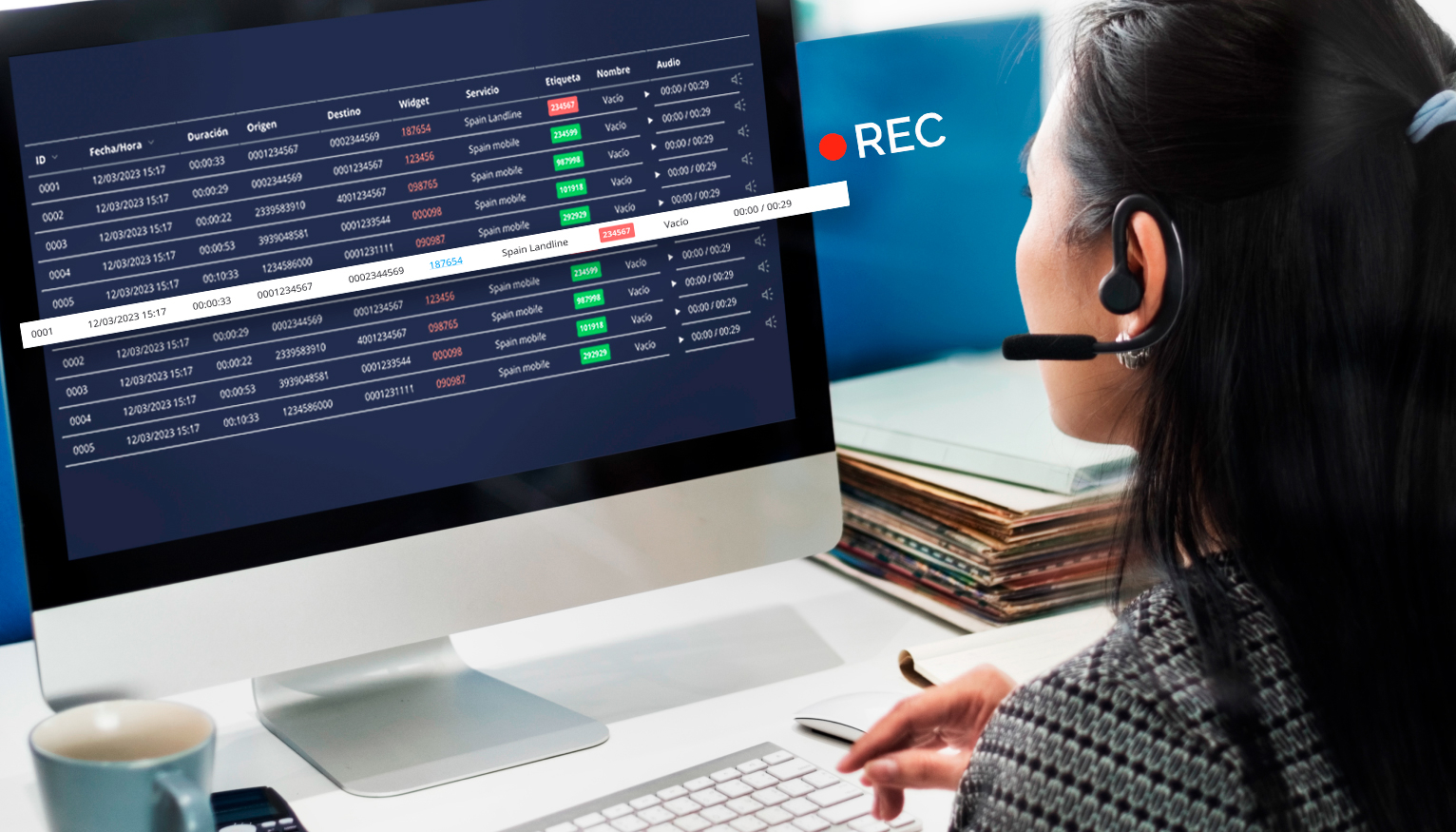Today , the business world has recognized the need to record all calls of a commercial nature, and although one of the main reasons to implement a call recording system is to analyze telephone conversations, to improve the quality of service and the user experience, there is another equally important reason: Comply with current laws and regulations
An example is the recently approved Customer Service Law</ strong>, which not only forces some companies to record calls, but also to provide customers with access to these recordings.
Now, what exactly is business call recording and why is it so appreciated?
Keep reading! Next, we will highlight some of the reasons that make this functionality essential for call centers, and we will explain how it can help improve your business processes and increase customer satisfaction.
💡 Do you want to know more about the new Customer Service Law?
Don’t miss our article: “Customer Service Law: How to prepare for the entry into force of the new regulations”.
What is call recording and what are its benefits
The recording of telephone conversations has become an essential practice for many companies, which little by little have incorporated this feature into their call centers, in order to obtain better results, both for its clients and for its corporate reputation.
This functionality consists of recording and storing telephone conversations that occur in a business environment, such as the customer service center, and although it seems simple, it is a feature that can be extremely valuable for your business, for several reasons:
1. Improved service quality:
By recording calls, you will have the opportunity to review and analyze interactions with your customers. This will allow you to identify areas for improvement, detect recurring problems, train your agents more effectively and guarantee constant quality service.
2. Resolution of disputes and claims:
Should customer disputes or claims arise, having an accurate record of phone conversations can be invaluable. By reviewing the recordings, you will be able to determine what exactly happened during the call and take the necessary steps to resolve misunderstandings, clarify information, and avoid unnecessary conflicts.
3. Legal and Regulatory Compliance:
In certain industries and countries, there are regulations and laws that require call recording when certain types of transactions occur. These regulations may be related to consumer protection, data security, or compliance with financial regulations, among others. Call recording will ensure that your business complies with these requirements and avoids potential legal penalties.
4. Training and training:
Call recordings are an invaluable tool for the training and development of staff in your contact center, as they allow new employees to listen to conversations between your customers and other more experienced agents, to learn how to handle different situations, improve your communication skills and understand what are the best practices, in customer service.
On the other hand, managers and supervisors can use these recordings to identify areas for improvement and establish performance standards.
5. Data-driven analysis and decision-making:
Having call recordings will allow you to analyze the conversations, to obtain information about the interactions with your clients and generate reports, with trends, behavior patterns, frequently asked questions and recurring problems. These analyzes will provide valuable information about the preferences and needs of consumers, which in turn will help you identify opportunities for improvement. , optimize the processes of the call center and improve decision-making.
In short, business call recording is a crucial functionality in customer service centers, since, as you can see, it improves service quality, facilitates dispute resolution, ensures legal compliance, boosts staff development and provides fundamental data for decision making.
If what you are wondering now is whether this practice will be appropriate for your business, continue reading, below, we will detail who can benefit from this practice.

Which companies should use a call recording system?
In general, many organizations can benefit from a telephone recording system, but the utility and feasibility, may vary depending on the type of business and its specific needs.
Here are some considerations to keep in mind:
✔️ Customer Service Departments:
CCall recording allows customer service departments to monitor and evaluate service quality, train employees, resolve disputes, and generally improve customer satisfaction.
✔️ Sales Departments:
Call recording systems can be a valuable tool for monitoring interactions with customers, identifying opportunities for improvement in sales techniques, and evaluating customer performance. commercial.
✔️ Technical support departments:
Companies that provide technical support can take advantage of call recording to monitor the quality of service, evaluate the effectiveness of the solutions provided and improve problem-solving processes.
✔️ Financial organizations and basic services:
Recording calls is essential to comply with the requirements that legal regulations impose on certain types of companies and organizations; In addition, these recordings can be used as evidence in the event of a dispute, so they not only guarantee regulatory compliance, but also protect the company in the event of a dispute.
It is important to bear in mind that call recording must comply with local laws and regulations regarding privacy and data protection, therefore, before implementing a telephone recording system, it is essential to find out about the requirements to follow. .
Keep reading! We explain how to comply with current regulations.

Is it legal to record calls in your call center?
Call recording has become an indispensable practice for contact centers seeking to improve the quality of service and customer experience, but we must not forget that we are talking about functionality subject to various laws and regulations.
These are the main regulations that you must take into account:
# Organic Law on the Protection of Personal Data and Guarantee of Digital Rights (LOPDGDD):
This law establishes the principles and requirements for the processing of personal data, including call recordings. Some key points to keep in mind are:
• Before recording calls, you must obtain the informed consent of the people with whom you are going to talk.
• You have to inform the interlocutors about the purpose of the recording and provide them with information about the data controller.
• You must guarantee the confidentiality and security of the recordings.
• Recordings must be used only for the specified purposes and may not be retained for longer than necessary.
# General Telecommunications Law:
The regulations, which regulate aspects related to electronic communications, establish that telecommunications companies can record calls in order to guarantee the quality of the service or to prove the existence of contracts. Some points to consider are:
• You must inform the interlocutors about the recording, at the beginning of the call.
• The recording can only be used for specific purposes, related to the provision of the service.
• You have to ensure that the recordings are accessible only to authorized personnel, and that steps are taken to protect their confidentiality.
# Customer Service Law:
In 2024, the new Law on Customer Service Services is expected to come into force, and, although due to the recent electoral advance, the final legal text is still up in the air, the new regulations will represent a significant advance in the protection of consumer rights and a considerable improvement of the shopping experience; To this end, among other measures, the possible future law establishes that, if the complaint or claim is made by telephone, the company must record the call and inform the customer of the means to access said recording.
In any case, it is always important to consult with a specialized legal advisor or expert to obtain specific guidance on how to comply with the applicable laws and regulations in each case.
Now that we know more about call recording systems, let’s see what characteristics this functionality, which is increasingly in demand, should have.
What should a call recording system offer?
To ensure efficient and effective operation, call recording software must have a number of key functionalities and features:
1. Automatic recording:
The tool must be able to automatically record all calls without the need for manual intervention. This ensures that no important calls are missed and makes it easy to review interactions.
2. Storage and management of recordings:
The system must provide adequate storage capacity and an intuitive interface, in order to manage and access recordings efficiently. This includes options to search, filter, and sort recordings, based on criteria such as date, time, phone number, or call duration.
3. Integration with CRM systems:
It is beneficial if the call recording software integrates with the CRM. This makes it possible to link call recordings with customer information and makes it easier to track interactions.
4. Safety and regulatory compliance:
Call recording software should offer encryption and authentication options to protect the confidentiality of the data. In addition, you must comply with applicable legal and regulatory requirements regarding recording, such as privacy and data protection laws.
5. Access and permissions:
It is important to have an adequate permissions structure, which allows you to manage who has access to call recordings and what actions they can take.
In addition to the features we just discussed, some call recording solutions also offer advanced options such as Speech Analytics, Artificial Intelligence, and Machine Learning, which are definitely helpful. essential to extract valuable information about the performance of agents, the quality of service or customer satisfaction, among other aspects.

CONCLUSION
Without a doubt, conversational analytics and reporting are experiencing significant growth in contact centers today. This is due to the enormous help they provide when it comes to identifying areas for improvement and optimizing decision-making, based on data.
Obviously, the starting point for all this data will be the call recording system, which must meet the necessary requirements to allow effective analysis, therefore, it must be a comprehensive solution that provides security, connectivity, integration capacity and complies with the corresponding legal requirements.
The Webphone call recording system rigorously complies with all technical and legal requirements in force; In addition, our technical team provides continuous and dedicated support to ensure that the service will always be updated and operational, and with optimal performance at all times.
If you need more information about our call recording solution Contact Us!
